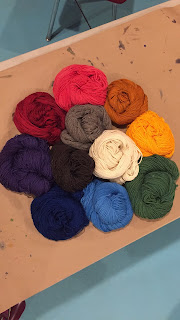Where were we? Inigo Montoya would say, “Let me
Explain. No, there is too much, let me sum
up.”
We sourced fleece, had it spun into yarn, and then set about
dyeing it in cjkoho Design’s studio.
(For the longer version, look at Monday's post.)
Carla and I talked about the colors we wanted, and decided
on a palatte of kettle dyed semi-solids to go along with the natural grey and
dark brown. We thought six colors that
worked with each other would be perfect.
The natural colors would round that out and we’d have a full spectrum to
knit with.
I’m going to be honest here.
With the tie dye that Princess Monkey Toes has made for her scholarship
fundraiser, we’ve purchased dyes, mixed them up, and dyed according to the
directions. She did a pretty great job
of things, and her mom and I felt proud to help her achieve so much last
summer. She made beautiful items that
sold across the country and she was able to send a girl to MichFest with her
earnings. (There are still a few pieces
in my etsy shop if the thought of spring and tie dye has you looking for a
fresh piece for your wardrobe.)
This, my friends, is not how professional fiber artists
roll.
There is a PROCESS.
There is mixing.
Dark blue does not come right out of the powder, it is
CREATED by the fiber artist by mixing just the right amount of this, with the
right amount of that.
Much like with knitting, where we swatch to see if we like a
stitch pattern, in dyeing there is sampling too. Carla carefully measures and mixes and drops
just a touch of color on a filter to see if it matches her expectations.
I kid you not, folks.
She is particular about her colors.
Do you see the slight differences in the reds here?
None of them met her expectations. We started all over again when these didn’t work out.
None of them met her expectations. We started all over again when these didn’t work out.
Once the colors were determined, Carla used her formulas to
measure just the right amount of dye for the number of skeins we planned to
dye. I wouldn’t be that far off in
comparing her to a scientist at this point.
The yarn is soaked, raised to a certain temperature, color added, heat
added, then it needs to cool, be rinsed and washed, and dried, and put into
skeins.
It is a very precise and labor intensive process.
Those of you who know me personally, know that I’m not
especially patient. I pushed the process
a bit and put the kettles out on the porch to cool in the cold February
afternoon. Carla rolled her eyes a bit
at me, but allowed me to feed my impatient curiosity at seeing the yarn in its
final state.
After the end of three long days on our feet, here is what
we ended up with.
You can see that we’ve got a few more than the six colors we
intended.
Carla tells me that part of the magic of dyeing is in what
happens in the dye pot. In spite of her
meticulous measuring and our sampling, the dye absorbs and attaches to fiber in
unique ways. Some of the colors, while
not what we expected were colors we fell in love with, so we kept them.
We will have this lovely yarn at Yarn Con on Friday (that's only a couple of days from now!!) and (if there is any left) at the Spring Ann Arbor Fiber Expo April 9-10. Come out and see me!
If you’ve been paying attention, you know the next part is
pattern support. I’ll tell you more
about that next time.
P.S. Pattern updates are happening soon! Now's your chance to grab previously published patterns at a lower rate.
P.S. Pattern updates are happening soon! Now's your chance to grab previously published patterns at a lower rate.









No comments:
Post a Comment
Thanks for reading, I'm eager to read what you have to say in response. Your comments help me feel that I'm not writing into a void. . .keep them coming!